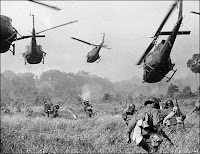I’ve tried to fin out what a Saigon means, but I couldn’t find it. In my head, without any reasons, I thought it was an exotic word for ”fighter”. Then I searched for the name to be sure I knew where they’re from and find out that they where from
Vietnam (http://www.behindthename.com/bb/arcview.php?id=26810&board=gen) and obviously Saigon is a River I Vietnams biggest city: Ho Chi Minh City (http://en.
wikipedia.org/wiki/Ho_Chi_Minh_City). It also says that Ho Chi Minh City is formerly was named Saigon and that might be the reason to why the place they lived in California was named “A Little Saigon” (p. 174).
Anyway, the siblings and their mother are running away from the crime in Saigon and since they say “Saigon” and not “Ho Chi Minh City” it must be some time ago. Ngoc is also mentioning “the new police & the old police, the murders of our neighbors” (168). It’s sounds like a war, the Vietnam War?

When they are escaping their own country, a man says it’s only room for the two girls at the first bout and their mother has to go to next boat. The man is grinning so it’s definitely on purpose. To give her little sister, Mai Chi, water and food on the long, hard trip she “gives” herself to the Captain. People on the boat is so exhausted that they don’t care. This part was hard to read, I just can’t believe how cruel people can be sometimes.
Finally people from an Australian boat rescued them, but they never find their mum. The move to their mom’s cousin’s family in The Little Saigon in California. But their mother’s cousin was ashamed of the two girls of many reasons. One because she thought Ngoc had killed Jack Pirate. I’m not sure when this happened, but it must be after he got caught by the sailors because she saw he was taken away alive with his arms locked behind him. Another reason was that I think Ngoc became pregnant. It’s difficult to read that part or may I say; hard to interpret. But it seems like Ngoc is not trying to hide it either. And before, even it was of one’s own free will or not, it was a shame to be pregnant in young age and maybe even outside a marriage. But most of all, the shame was pointed at Mai Chi who started to look like his father.
Her father was a black American who was a soldier in Vietnam. He was a nice and kind man, but what they did was a shame for the Vietnam people back then. And it seems like Mai Chi get’s punished for what her parents did by narrow-minded relatives.
One day, their aunt who moved to French for a long time ago, came with both bad and good news. The bad was that their mother was dead, but the good one was that their aunt (a person their mum loved very much, unlike their mother’s cousin) wanted to take them back to French. Finally they are at a place where they are safe and loved.
The short story “Zelzah: A Tale From Long Ago” is about a question that is still important today: what is happiness? The action takes place about many, many years ago in Poland and this Jewish family with five girls struggles to get enough money. For poor families like this one, it’s important that the daughters get married so their men can take care of them. It’s harder to find husbands to girls with poor parents so for some of the girls a marriage is the way to happiness. We follow the second oldest daughter, Zelzah to America where she is marying a relative in Vermont, America. But before they got married, her cousin fells in love with another girl and marries her instead.

Zelzah goes to New York and gets an education and becomes a teacher. Her little sister Shulamith comes over to live with her but after a while she finds her a husband and moves away. Zelzah is still single and her sister says she still can get married. But does she need one? Is she happy now? She was laughing when her cousin reject her offer to be his wife and mother to his child after the real mom and wife died in childbirth. And now she teaches third grade kids who gives her happiness, she decides what she wants to do all by herself. She got her independence, but is she missing something bigger like a marriage?
And who can tell what a happy life is like?

My father has one opinion of what happiness is, my friends have another. I think it’s important to sit down sometimes and really think about what is happiness for you? It’s easy to get influenced by the environment, like many people think money is important if you want to be happy today. But do you?











 Now I released that the two short stories was supposed to be in the same blog post, so this will be considerable shorter.
Now I released that the two short stories was supposed to be in the same blog post, so this will be considerable shorter. 




